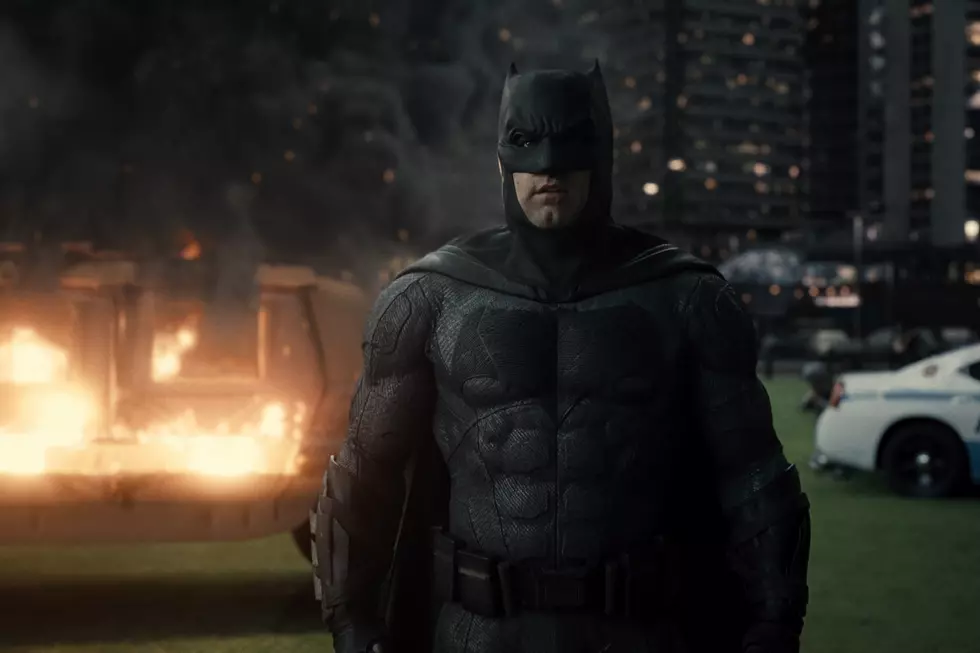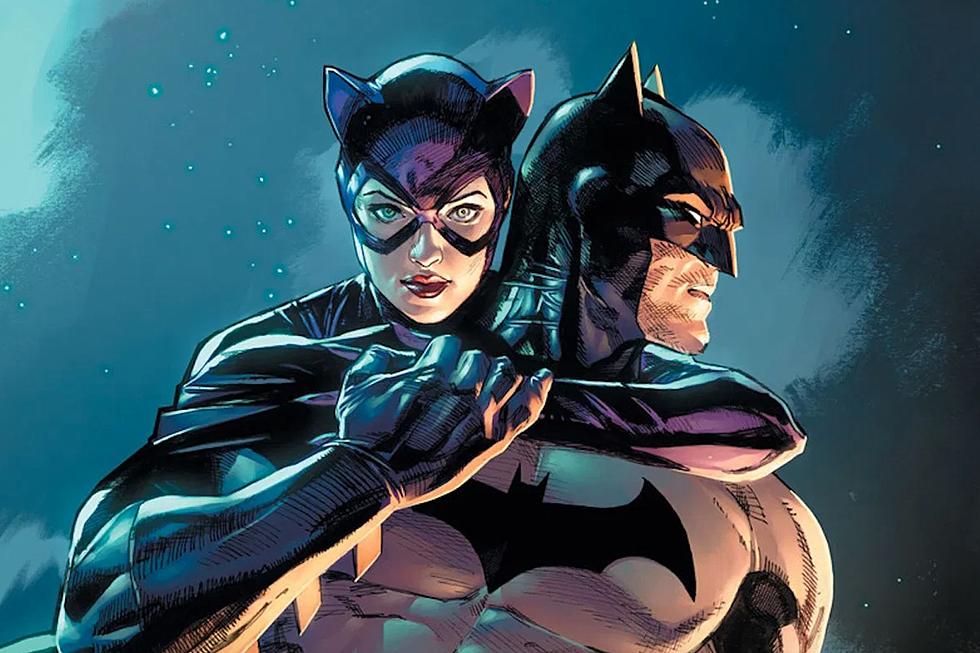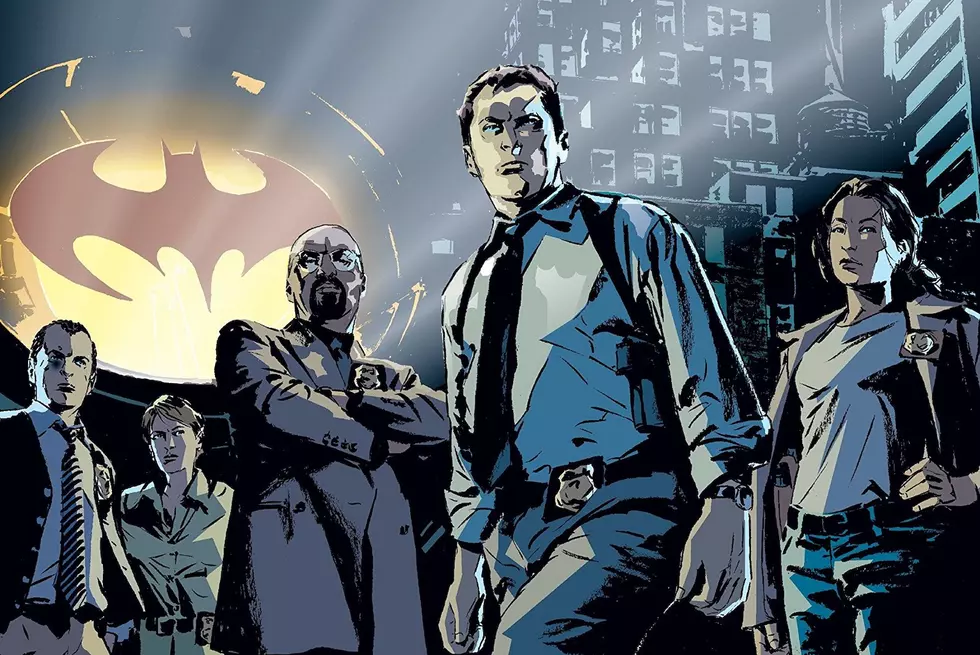![Batman Is A Fact Of Life: Greg Rucka Reflects On His Batman Work, Part Three [Interview]](http://townsquare.media/site/622/files/2014/09/Central01.jpg?w=980&q=75)
Batman Is A Fact Of Life: Greg Rucka Reflects On His Batman Work, Part Three [Interview]
To say that Greg Rucka had a profound impact on DC Comics in the 21st Century is underselling things quite a bit. After arriving on the scene in the late '90s, he became one of the few writers to have written all three of DC's biggest characters, with critically acclaimed runs on Action Comics and Wonder Woman. It was on Batman, however, where he made his biggest impact, as one of the writers for the year-long No Man's Land crossover, the relaunched "New Gotham" era of Detective Comics, and cowriter of the enduringly influential Gotham Central.
In part one of our in-depth interview, Rucka discussed his arrival in Gotham with the popular "No Man's Land" megaseries. In part two, the writer detailed his involvement in the "New Gotham" revamp of 2000, including the Bruce Wayne: Fugitive saga, the introduction of Sasha Bordeaux, and the difficult transition from longtime Batman group editor Dennis O'Neil to Bob Schreck.
Today we finish our three-part interview series with a look at Gotham Central, the book that focused on the non-superhero police detectives of Gotham City. Rucka speaks at length about how looking at Batman from the outside changes how the character works, the nature of collaboration with series co-writer Ed Brubaker and artist Michael Lark, and how the book produced one of the greatest Joker stories of all time.
ComicsAlliance: A few days ago, Ed Brubaker was tweeting about the origins of Gotham Central, and mentioned that it came out of the events of Officer Down, where you and he had a really good time writing all the cops, and started pitching a book that would be just that. Were you familiar with his work before he started writing Batman?
Greg Rucka: I read Scene of the Crime. I didn't know his work prior to that. This was the transition phase. We were in Upper Nayak for a Bat summit, and it was sort of the changing of the guard summit. It was at Denny O'Neil's house, with Bob Schreck, and that's where the idea was initially pitched for Officer Down, if I remember correctly.
Ed and I were standing outside talking, and I remember that I'd been carrying around in my wallet for months a pie chart that I'd torn out of the back of Wizard that was a poll: "Which Batman character needs his own book?" Overwhelmingly, it was Commissioner Gordon. So we were talking about the cops, and I was like, "We've gotta do a cop book. I want to do a cop book." And he was like, "I want to do a cop book!" "So let's do a cop book!" It wasn't terribly long after that we ended up in another meeting, this was in the city, and somehow or another we had managed to convince [DC executive editor] Mike Carlin that we needed to do this, and there was an argument about what the book needed to be called.
It was a given that no book would sell if it did not have the name "Batman" in it, and we were like "But the point is that it's not Batman!" And it was like "No, it's gotta be something like Batman: Cops of Gotham." And we kept saying, "no, no!"
CA: You didn't want it to be Batman's Pal Jimmy Gordon?
GR: No. No. No. That just didn't seem to have the right ring. Ed remembers this better than i do, but I think Ed just threw it out there, and somehow we managed to force it down their throats. And the book gave Carlin fits, not unreasonably, because where's Batman? Where are the villains? This is supposed to be a superhero comic! But of course it wasn't supposed to be a superhero comic. To steal a phrase, it's not a subtweet, but it's supposed to be a sub-superhero book. It's about superheroes who are never seen.
Like I said, there have been so many good writers and so many brilliant artists over the years who have defined and redefined Batman, to such an extent that to me, and only to me, I found that he was far more interesting to me when we were outside of him. I didn't want to be in the Batcave. I didn't want to be in his head, because that lost the mystique. I remember getting a piece of art once, and this was in Checkmate. There was a page 22 reveal, and it was supposed to be Batman. And the description was just "In the shadows: Batman." Then we got the page and whoever had drawn it, it was a full figure, well-lit, every muscle had muscles Batman. You could literally see how many abdominals. So hyper-rendered. And I hate that. I hate that portrayal. This is a guy who's entire M.O. is "don't see me," right? Not "Hey, don't I look good in this costume?" Superman's the guy who says "Hey, I look good in this costume! I look good in this costume but I don't care." Batman says, "Don't see me." I hate that. I hate that reveal.
And that's what Gotham Central was supposed to be. You never see Batman, or you see him too late, or you see him leaving. One of my favorite moments is when Allen thinks he's talking to one of the detectives in the squad room during Half a Life, and he realizes as Batman's leaving that he's been gamed by Batman. That, to me, was the key interaction. That was the way the rest of the world had to see him. If you were getting a good look at Batman, you did something really wrong. This is not a guy who hangs out in the light, he sweeps down, does the business, and goes. Ed and I were on very much the same page with regards to that.
CA: There had been a few attempts to do a similar style before.
GR: Yeah, Chuck Dixon had done a couple, and there was Denny's.
CA: Yeah, Gotham Nights and even as recently as '98, Denny O'Neil and Dick Giordano did a miniseries called Gordon of Gotham that I don't think anybody read.
GR: I read it. I read all that stuff.
CA: You read it, I read it, and I think that's it.
GR: It was just us.
CA: But then you have No Man's Land, and you have that gap at the beginning where Batman's not around, and you have the focus shifting to the cops as one of the gangs, and Gordon and the cops really take a prominent role. You get a focus on them that you don't necessarily get, especially for cops who aren't Harvey Bullock and Jim Gordon. It feels to me like it all starts there.
GR: Yes.
CA: Then you bring in characters like Josie Mac, who's my favorite Judd Winick creation after Barry Ween. You bring in a lot of that stuff, but a lot of them were characters that you'd either created, like Cris Allen, or had a huge hand in bringing to prominence, like Renee Montoya. What do you think worked about that book that hadn't worked in the past?
GR: I think it benefitted from a couple of things. It benefits, and this can never be overstated, enormously from Michael Lark. We had a talk, almost a year ago, and he's always described his stuff as photorealistic. You know what it was? I'd been reading David Mamet's On Directing Film, which is, incidentally, if you want to write or draw for comics, required reading. Regardless of what you think of the man, and I don't hold him in very high esteem, he has some really interesting things to say about how shots are made and constructed, and he talks about what he calls "the uninflected shot." I was reading that, and it hit me that that's what Michael does. That's his genius. It's not photorealistic, it's photojournalistic.
You take that, and then you take Ed's sensibility and my sensibility, which are very much on the same page about what the cop life is like in Gotham. It starts from the same page, where you are a good cop in a rotten city. You're one of very few good cops in this rotten city. It's your job, and you do it day in and day out, and the guy who runs around in the bat suit is alternately your best ally and your worst problem. I think one of the things that makes Central work is that it isn't ever about the case, it's always about the detectives on the case. It's about their lives in Gotham.
It's the same reason we watch Hill Street Blues, if you watched Hill Street Blues, or NYPD Blue, the list goes on and on. Their stories are compelling stories, because the job is a compelling story, and then you add on top of that "You know what? It may have been the Riddler who did it."
Ed and I had the biggest laugh when we realized that it had to be a thing in Gotham that robbery detectives would routinely be like, "You know what, I can't close this case. I'm gonna beat up this guy until he says Catwoman did it, and then toss it up to Major Crimes, and they'll have to deal with it because it was a freak." There's a moment where Allen goes off on somebody because of it. "You drop this in front of me and you think I don't know what you're doing?"
You combine a "realistic" take on what it would be like to be a cop in Gotham, and then you marry that with Michael Lark and Stefano Gaudiano, and you get a book that didn't look like anything else out there, that took itself seriously, didn't apologize, didn't wink and nod. Because again, to take it all the way back, it only works if you don't pull the threads. You have to accept that Batman is a fact of life in Gotham City, and on top of that, you have to accept that somehow this city manages to function with a police force that's 90% corrupt. We took all of that stuff incredibly seriously. We never winked and nodded. It was damn serious, and the tone was set as serious by page four of the first issue, when these poor guys are responding to a tip and holy Christ it's Mr. Freeze! They're outclassed. There's nothing they can do.
CA: It's a book that simultaneously makes you understand the cops and their frustrations, and makes you pity them because they're not Batman.
GR: In that first issue, you get the thesis statement in those first four pages. "This is why you need Batman." You need Batman because Marcus just watched his partner get shattered, and he couldn't do anything about it. How do you fight that if you're a cop? How do you make that right? How do you get over that? How do you come to work the next day?
CA: It's one of the few times that I feel like doing something that grim, because it's a very grim book, does what its doing in a way that doesn't undercut the underlying heroism. The message is that not everybody's a superhero, but they still have a job to do that they're going to do. That's very engaging.
GR: And they don't stop. That's the other thing.
CA: I'm sure we could talk for another hour about Renee.
GR: Easily. [Laughs] You could do a whole other interview that's just about Renee.
CA: We might have to, because I really just want to talk about Soft Targets.
GR: Okay. We'll talk about Soft Targets.
CA: I promise we'll do an interview about Renee in the future, if you're up for it, but Soft Targets is my all-time favorite Joker story. You'd stayed away from the Joker for a long time. Brubaker had used the Joker very sparingly in Dead Reckoning, another of my favorite Batman stories, but he's only in there for a few pages. So then you do Soft Targets. You mentioned that when you wrote the No Man's Land novel, you wrote from Harley's perspective so that you wouldn't have to get in the Joker's head, and Soft Targets functions the same way. The entire book functions that way on one level, where it's an outside view of supeheroes and villains, but in this story, you only see the Joker from the POV of the cops, and it's the most terrifying that character has ever been.
GR: [Laughs] Yeah.
CA: Like you said, you kill a guy on page four of the first issue. You can't kill Batman, you can maybe kill Robin and he might stay dead for 20 years. But you can kill Josie Mac, you can kill Cris Allen. All of those characters are in immediate jeopardy. That's part of what makes him so terrifying, but the rest of it was just how he was presented.

GR: "Zut alors! I haf missed one!" [Laughs] That, to me, is one of the most frightening moments. He's having the best day ever. It's fantastic.
CA: It's an amazing cop drama. The entire setup for the scene where he's in the interrogation room. Obviously, the entire sequence is a huge influence on The Dark Knight, there's no getting around that. The Joker's in the interrogation room, he's not talking, and Probson puts his badge down and he's going to go beat the Joker with a phone book until he talks.
GR: He puts his badge and his gun down and says that he's going in there and he's not a cop.
CA: Which is amazing, because he essentially becomes a vigilante in a city that's defined by a vigilante.
GR: Yeah.
CA: And the entire book is about not doing that. "He's the vigilante, we're the cops." And then he goes in and the consequences of a person who's not Batman acting as a vigilante are swift and dire.
GR: Yes. It all goes horribly, horribly wrong. Maggie Sawyer, however, gets a wonderful claim to fame.
I think, in memory, that had been Ed's idea, and it was frickin' briliant. I'll tell you, I can't remember -- and I'm sure he can -- I can't remember who wrote what on a lot of the two-hander stories, which I think speaks to the strength of that collaboration. The odds are that it was Marcus, Nora or Romy, it was Ed writing it, and if it was Renee, Cris, Maggie or Simon, it was me, but not always. I'm not even looking at it right now but I remember those pages. I remember Michael bringing them in and just thinking oh my God, this is amazing. They're brutal. They're so savage, and they're savage in a way that, over in Batman or Detective, it's not, because it's so tacticle. It's so real.
CA: It feels so real, which is funny to say because it's a comic about the Joker. But I was wondering if it was Brubaker who did those scenes, because there's a very similar bit to the Joker giving up that he does in Daredevil, which was also drawn by Michael Lark. Matt Murdock's in prison, and Frank Castle, who I believe you are also somewhat familiar with...
GR: I have a passing familiarity with Captain Castle, yes.
CA: Frank's at a diner, he sees the news, and he goes out to get arrested. He kills a guy in front of a cop to get arrested, the cop tells him to put his hands up, and when Frank puts his hands up, it pulls his jacket open and you can see that big Punisher skull underneath, and the cop loses his mind because he realizes he's dealing with the Punisher.
CA: They're similar scenes, but when you read the Daredevil scene, you smile. I got this big goofy grin on my face. But you read that scene in Gotham Central, and you get scared.
GR: Good. He should be scary. He should be frickin' terrifying! If one of the theses of the book is that this is why Batman is a problem, but this is why you need Batman, then you need Batman. That story was just me and Ed looking at the Beltway Sniper and just thinking "The Joker with a sniper rifle," period. That's the whole story. The Joker with a sniper rifle. It writes itself. It really does! All you have to do is get out of the way and that story will tell itself.
The greatest argument for why you need Batman in the whole series is that story. It's the crisis of conscience story for Marcus, far more than the first arc. The realization that there is a whole order of magnitude beyond what these people are doing day in and day out, and they don't rate. There's almost a Lovecraftian horror element to it. There's Batman and the Joker and they're in their dance, and other people just get caught and they're destroyed. They get caught in the wake.
Joker doesn't care, or cares in as much as he enjoys it, right? That's his sadism. From the cop point of view, and it is from the cop point of view, it looks like Batman doesn't care. And that, to me, goes back to what I was saying: The view from outside is more compelling than the view from inside, because we know he does care. We know it's killing him. We know that every life he couldn't save, he blames himself for personally. But the cops never see that, and they never can be allowed to see.

CA: Aside from Soft Targets and Half a Life, which I imagine we'll talk about for eight hours someday, do you have any other favorite moments?
GR: Oh, so much of that. I love the Dead Robin story, because I love that problem. You have to treat it like it's him, because you don't know it's not. I love the moment where they have to bring the Teen Titans in for questioning.
The logical extrapolation of "This is Robin, he's dead. We need to either produce a Robin and prove that he's the real Robin, or Robin is dead." And I love the idea that the Teen TItans would have to go to Gotham and talk to the police. There was a whole scene where somebody had to explain to Raven that they were going. I love the scene where they walk into the squad room.
I like the Keystone Kops storyline. It didn't actually go quite the way I wanted to, but it was another great way to show how different life was in these two different corners of the DCU, being on the ground in these different areas. There are very few Central stories I look at, and I'm speaking of the ones I wrote, I won't speak for Ed on this, but there are very few that I'm unhappy with. I really like the one with Johnny Lamonica, the Black Tarantula, where Allen saves Renee's life. I'm fond of that story. I'm fond of the little old lady who collects supervillain paraphernalia. I'm fond of Renee beating the living snot out of Corrigan. One of her finest moments, in my opinion, is in that alley. "All your buddies just watched me hand you your ass. You want to get up? Because I can do this all night." I was just like "yeah, you go." I'm very fond of that moment, even if it's Renee starting a very dangerous downward spiral. That's the start of the rollercoaster for her really plummetting after Half a Life, as she's dealing with that.
It's a long list. Ironically, there are very few runs at DC where I was able to leave, as opposed to being invited to depart, or told in no uncertain terms that I was no longer welcome on this title. As a result, there were very few runs that I felt I got to resolve in a way that I wanted. It's important to remember that Central wasn't canceled. Central ended. And it was the ending that Ed and I had always discussed, and even though he wasn't involved with the book at that point, we knew it had been coming from the start. I'm grateful for that. I think it's one of the things that still allows Central to stand: It had its ending. Renee left. And Renee left just before she was never going to be able to.
CA: Over the course of this interview, we've talked about Batman in the most superheroic setting he can be in, which is basically Escape From New York. We talked about Batman in a street-level crime book. We talked about Batman through the eyes of other characters. Final thoughts? Did writing him in those distinct areas, as well as writing him in contrast to characters like Superman and Wonder Woman, change how you saw the character?
GR: You spend that much time with a character, and you learn more about them. One of the things that we really wanted to try to do post No Man's Land, and it absolutely failed, is that we kind of wanted to move Batman away from this self-loathing that was starting to manifest. He can't spend every night going "Mom! Dad!" He can't do it every night. After thirty years, he's got to put it down. He's got to acknowledge that is not what's driving him.
The books didn't need to become light. It wasn't an issue of levity or diminishing it, but we wanted Bruce to grow past that. And... Oh boy, that clearly didn't happen. For me, and it's interesting because you can look as he moves through the Detective run and then into Central, where you're not in his head so you only see him through their eyes as this grim force, right? I got to a point where I could see the moments where he did enjoy himself, where he could smile. He certainly was never going to do that wearing the cowl out on the street, unless he was going to do it for effect, but it mattered to me, just in my own personal view of him, that he had moved at least a couple steps beyond this grim, grim horror that was the constant portrayal.
On some level, and Mark Waid has been a guy who'd advocate for this absolutely, this is a guy who looks around going, "This was a horrible, horrible tragedy, but my life is kind of awesome. There's some awesome in this. I hang out on a satellite with a Martian. That's kind of cool right there. I'm never going to tell anybody, but that's cool." I kind of want to grant him that. I don't think it diminishes anything for him to have a moment where he goes "You know what? I'm pretty good at this. It's not bad. Okay, back to work."
More From ComicsAlliance









